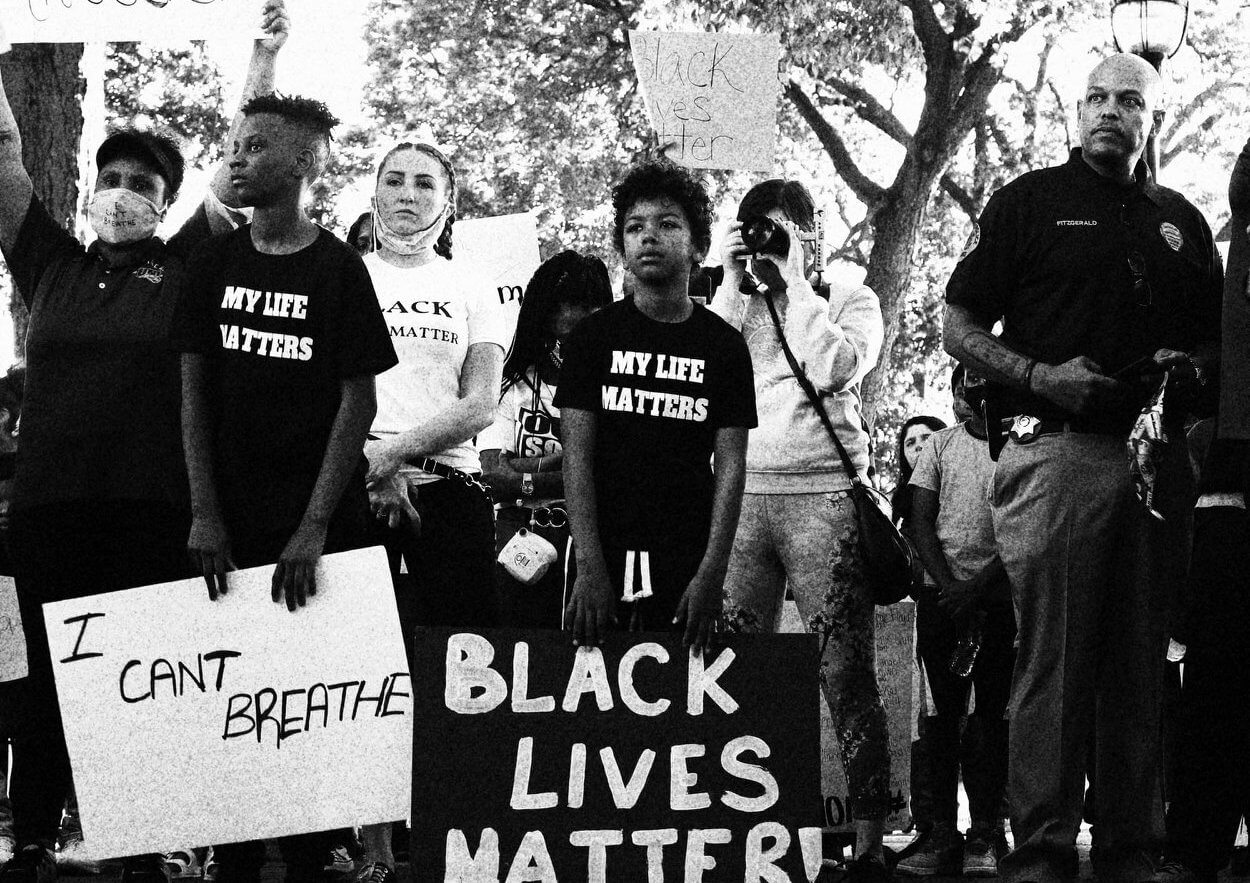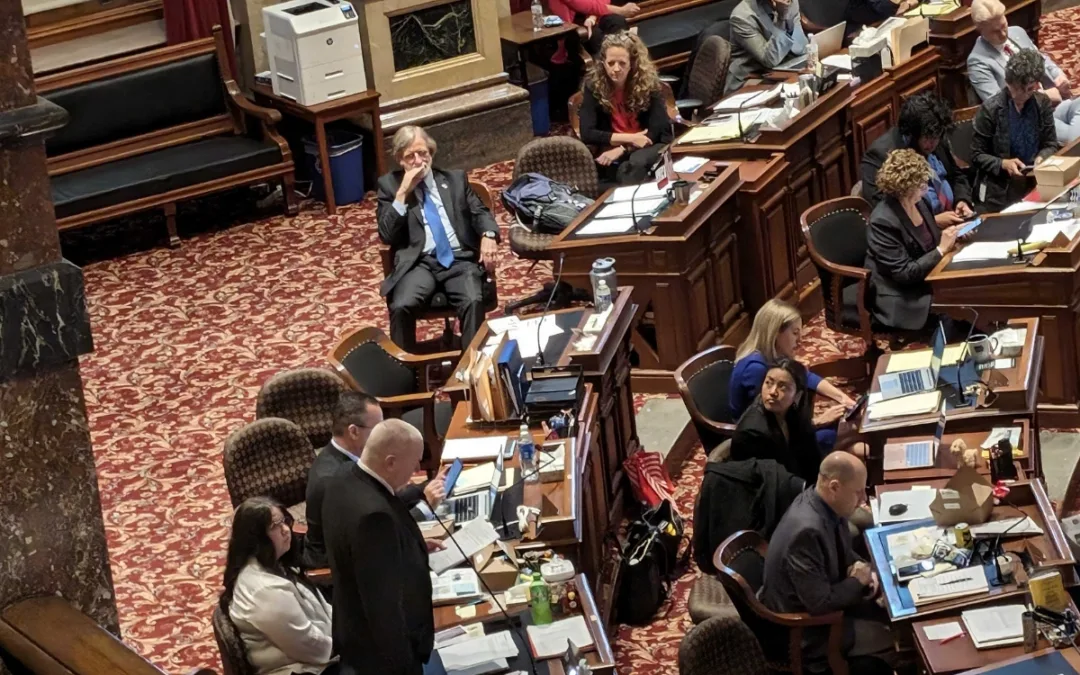
Photo by Tiahni C. of ShinDigg Photography
Waterloo’s first-ever African American police chief had a busy first day on the job. Joel Fitzgerald was sworn in this past Monday, as protests of George Floyd’s death unfurled throughout the state and nation.
Shortly after, Fitzgerald attended one of the city’s several large and nonviolent protests, one without police in riot gear standing nearby.
“What are you going to do different from [former Chief Dan Trelka] that he didn’t do? Because he didn’t care about us,” one woman asked Fitzgerald at the protest. “I expect more from you because you look like us.”
“I’ll tell you this. I wouldn’t be here, in the middle of a throng of people raising my voice and trying to get my point across if I didn’t care about what’s going on,” Fitzgerald answered. “We are going to sit down as a community and as a police department and hammer out what we’re going to do moving forward. Together.”
https://www.facebook.com/vikki.brown.121/videos/1933090216826139/?hc_ref=ARTkL4ROR6JJQ6CLTZy1kMKrOhGbTrPQw17GDcu9NocNl-EHtz1cK9qlXfJSPkeO6gs
Waterloo has undergone a great deal of self-reflection since its 2018 ranking of “Worst City for Black Americans” rating by a website called 24/7 Wall St., according to officials and activists, who say the city’s recent protests have been significant for the community because of their inclusion of police and African American public officials.
[inline-ad id=”2″]
Nia Wilder, a community activist, said that the protests are indicative of the city’s growth.
“We realized what we needed to work on after that article dropped, and so far there have been a significant amount of young leaders in the community that are doing whatever they can to turn those numbers around,” said Wilder. “I feel that after we complete the week out and everyone has their protesting done, and their voices have been heard … I feel like it’s going to do a lot of mending of the relationships between the community and the officers of the law.”
Monday wasn’t the only time Fitzgerald attended one of Waterloo’s protests. He also had marched last week with around a thousand residents, Mayor Quentin Hart, the city’s first black mayor, State Rep. Ras Smith, police officers and other public figures.
“It was a strong, assertive protest that was peaceful. It was a transformational experience for I think everyone who was there,” said Smith. “[Members of law enforcement] were with us. And I think that’s a real step to real change. For us, it marked something different. It felt different. My mother has been in the civil rights fight since she was a toddler, and for her to say that she felt something happen that day, it’s significant.”
Destruction of property was discouraged by most of those protesting in Waterloo, where black-owned businesses and leadership are prevalent. The city feels pride and ownership in their side of town, Smith said.
[inline-ad id=”3″]
At a local protest last week, a man wanted to start an ‘F the police,’ chant, which was followed by silence, Smith said. Another moment occurred when at the same protest when another resident wanted to snatch the microphone from Fitzgerald as he was talking. The entire crowd of over a thousand chanted ‘not today’ in response.
“Our protest was non-violent, also remembering that in our city, we take pride in our community. We take pride in the fact that we have black-owned businesses on our main street … We’re so proud of our Mayor Hart, why would we go and burn down our City Hall, where our black city councilmen and our county supervisor Chris Schwartz advocate for us every day in this community?” Smith said. “Why would we destroy our black-owned businesses … who are owned through blood sweat and tears by people of color. That’s our foundation for our tomorrow.”
Fitzgerald did say that “a small group of people” turned to violence at late-night protests. But the city’s early marches were a contrast to those in cities like Des Moines, where police fired tear gas, pepper spray and rubber bullets at protesters.
“No matter where you are in this country, it might present itself a little bit differently, but racial inequity is a problem in every corner of the country and so I am certainly devastated to see tear gas being used,” said Rep. Heather Matson, D-Ankeny, who said she’s heard of some of her constituents going down to Des Moines for protests. “A riot is the language of the unheard. When people are unheard for so long, it’s an understandable outrage.”
[inline-ad id=”5″]
Des Moines also implemented curfews to contain protests, which Black Hawk County supervisor Chris Schwartz said Waterloo did not do — instead working on more collaborative ways to work with community demands.
“This is a powerful moment unlike any other I’ve experienced in my two decades of organizing,” Schwartz said. “It’s going to be a win when it results in policy changes. But we are on that track. Whereas the Polk County board of supervisors is issuing curfews, we’re instead holding a work session on Ban the Box… I think every level of government has a responsibility to challenge systemic racism. And if that’s not your first priority in reacting to this moment, then you need to reexamine what got you into public service in the first place.”
by Isabella Murray
Posted 6/7/20
Iowa Starting Line is an independently-owned progressive news outlet devoted to providing unique, insightful coverage on Iowa news and politics. We need reader support to continue operating — please donate here. Follow us on Twitter and Facebook for more coverage.
Politics

AEAs cutting workers in wake of Republican legislation
Iowa legislators said a new bill cutting money for agencies that help students with disabilities wouldn't affect services. But area education...

He said what? 10 things to know about RFK Jr.
The Kennedy family has long been considered “Democratic royalty.” But Robert F. Kennedy, Jr.—son of Robert F. Kennedy, who was assassinated while...
Local News

No more Kum & Go? New owner Maverik of Utah retiring famous brand
Will Kum & Go have come and gone by next year? One new report claims that's the plan by the store's new owners. The Iowa-based convenience store...

Here’s a recap of the biggest headlines Iowa celebs made In 2023
For these famous Iowans, 2023 was a year of controversy, career highlights, and full-circle moments. Here’s how 2023 went for the following Iowans:...




